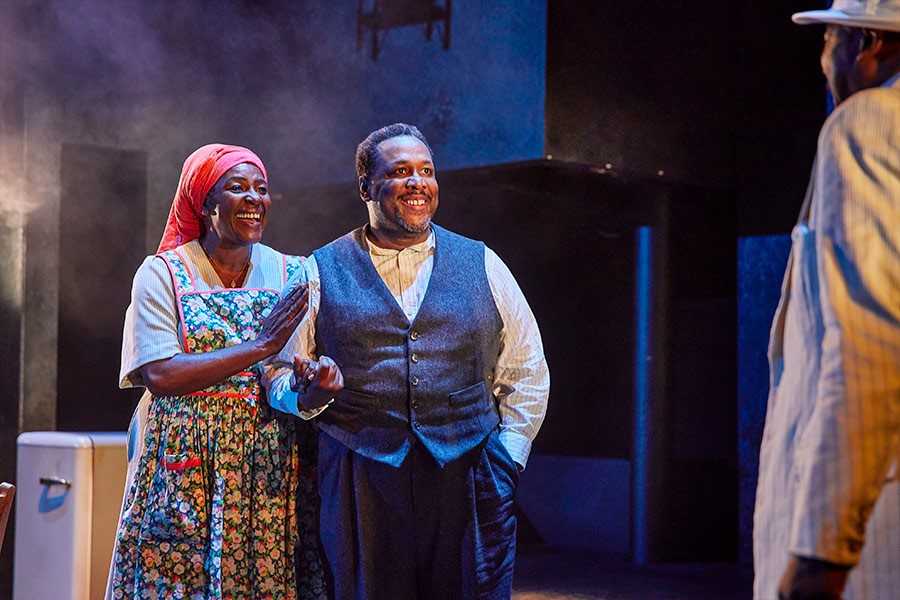Death of a Salesman at the Young Vic, London review: A straight-up production with moments of real power
Sharon D Clarke has her customary impressive presence, and when she turns on the scorn at her responsibility-shirking sons in arguably the best scene in the play, there’s simply no-one like her

Arthur Miller’s 1949 play Death of a Salesman is a cast-iron classic, and this is a very solidly wrought production – not startlingly revelatory, but given an extra sheen thanks to the casting of a black central family. And what casting: Wendell Pierce, of the The Wire and Suits, is Willy Loman; Sharon D Clarke plays his wife Linda, and Arinzé Kene his son Biff.
Willy Loman is a 63-year-old New York salesman, exhausted and humiliated as he stalls in his job, yet desperately clinging to the dream of the self-made man who makes it big. Or at least, the dream that his sons will manage it – but both the selfish, womanising Happy (Martins Imhangbe) and Biff, the high school sports star who seems to have thrown his life away, are disappointments. Willy is cracking under the strain, apparently suffering some kind of dementia.
Marianne Elliott and Miranda Cromwell’s period production doesn’t layer additional messages about race onto every scene – it doesn’t need to. The American Dream was always, for most people, a false one, due to circumstances beyond their control. Here, race becomes just one more barrier to “success”. And all Elliott needs to do is stretch out a few pauses – as when Willy is wondering what it is about his appearance that makes people not “take” to him – and the subtext is electrified. When Willy blows a fuse at his white boss, and the man physically flinches, and suddenly Willy is scraping and bowing as a reflex… well, it feels both a horrible new reading, and something very much contained within the play.
Death of a Salesman dreamily moves between the present and Willy’s memories of the past, as he loses his grip, and the directors largely find elegant solutions for this. Smartest is staging flashbacks to the boys as buoyant teenagers as if they were an old-fashioned slide-show: click, whirr, and they pop into a pose for a held second. Kene and Imhangbe have excellent, easy chemistry as brothers unsure of their place in the world – but they easily seem to shed a decade to inhabit their younger, more optimistic selves.
Made up of dark grey boxes, half shadowed or suddenly illuminated, Anna Fleischle’s set should serve the shifting states of Willy’s mind well; in fact, it often feels awkwardly clunky, like an oft-repainted black box theatre has been plonked on the Young Vic’s main stage.
Mostly this is a straight-up production, however, and while every performer has moments of real power, it can be a little strained towards Serious Acting. That said, Pierce makes for a markedly comic Willy Loman – he twists rapidly between the jovial bonhomie of the salesman and his own quick temper, but it’s a snap that becomes less amusing and more destructive as the play charts his decline. You long for his children to rescue him, and understand why they cannot. It is not always a towering performance, but it certainly contains moments of shuddering vulnerability.
Clarke has her customary impressive presence, and when she turns on the scorn at her responsibility-shirking sons in arguably the best scene in the play, there’s simply no-one like her. That scorn could fell an oak tree. Kene, meanwhile, is persuasive as Biff, pretty contained until a final showdown when he seems to stretch and strain and tear himself apart in front of his father. It’s heart-shredding stuff.
The notion of a crisis of masculinity may be very 2019, but this production reminds us that Miller was staging it 70 years ago. Every character is broken by his need to perform a damaging maleness: making money, getting to the top, showing no weakness. One of the sadnesses of this play is that this absurd way of valuing a man’s life, a man’s worth, still feels painfully resonant.
Join our commenting forum
Join thought-provoking conversations, follow other Independent readers and see their replies
Comments
Bookmark popover
Removed from bookmarks